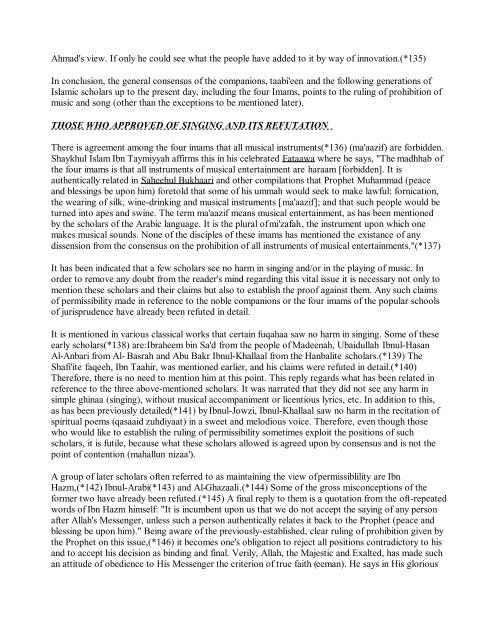The Islamic Ruling on Music and Singing - Enjoy Islam
The Islamic Ruling on Music and Singing - Enjoy Islam
The Islamic Ruling on Music and Singing - Enjoy Islam
Create successful ePaper yourself
Turn your PDF publications into a flip-book with our unique Google optimized e-Paper software.
Ahmad's view. If <strong>on</strong>ly he could see what the people have added to it by way of innovati<strong>on</strong>.(*135)<br />
In c<strong>on</strong>clusi<strong>on</strong>, the general c<strong>on</strong>sensus of the compani<strong>on</strong>s, taabi'een <strong>and</strong> the following generati<strong>on</strong>s of<br />
<str<strong>on</strong>g><strong>Islam</strong>ic</str<strong>on</strong>g> scholars up to the present day, including the four Imams, points to the ruling of prohibiti<strong>on</strong> of<br />
music <strong>and</strong> s<strong>on</strong>g (other than the excepti<strong>on</strong>s to be menti<strong>on</strong>ed later).<br />
THOSE WHO APPROVED OF SINGING AND ITS REFUTATION<br />
<str<strong>on</strong>g>The</str<strong>on</strong>g>re is agreement am<strong>on</strong>g the four imams that all musical instruments(*136) (ma'aazif) are forbidden.<br />
Shaykhul <strong>Islam</strong> Ibn Taymiyyah affirms this in his celebrated Fataawa where he says, "<str<strong>on</strong>g>The</str<strong>on</strong>g> madhhab of<br />
the four imams is that all instruments of musical entertainment are haraam [forbidden]. It is<br />
authentically related in Saheehul Bukhaari <strong>and</strong> other compilati<strong>on</strong>s that Prophet Muhammad (peace<br />
<strong>and</strong> blessings be up<strong>on</strong> him) foretold that some of his ummah would seek to make lawful: fornicati<strong>on</strong>,<br />
the wearing of silk, wine-drinking <strong>and</strong> musical instruments [ma'aazif]; <strong>and</strong> that such people would be<br />
turned into apes <strong>and</strong> swine. <str<strong>on</strong>g>The</str<strong>on</strong>g> term ma'aazif means musical entertainment, as has been menti<strong>on</strong>ed<br />
by the scholars of the Arabic language. It is the plural of mi'zafah, the instrument up<strong>on</strong> which <strong>on</strong>e<br />
makes musical sounds. N<strong>on</strong>e of the disciples of these imams has menti<strong>on</strong>ed the existance of any<br />
dissensi<strong>on</strong> from the c<strong>on</strong>sensus <strong>on</strong> the prohibiti<strong>on</strong> of all instruments of musical entertainments."(*137)<br />
It has been indicated that a few scholars see no harm in singing <strong>and</strong>/or in the playing of music. In<br />
order to remove any doubt from the reader's mind regarding this vital issue it is necessary not <strong>on</strong>ly to<br />
menti<strong>on</strong> these scholars <strong>and</strong> their claims but also to establish the proof against them. Any such claims<br />
of permissibility made in reference to the noble compani<strong>on</strong>s or the four imams of the popular schools<br />
of jurisprudence have already been refuted in detail.<br />
It is menti<strong>on</strong>ed in various classical works that certain fuqahaa saw no harm in singing. Some of these<br />
early scholars(*138) are: Ibraheem bin Sa'd from the people of Madeenah, Ubaidullah Ibnul-Hasan<br />
Al-Anbari from Al- Basrah <strong>and</strong> Abu Bakr Ibnul-Khallaal from the Hanbalite scholars.(*139) <str<strong>on</strong>g>The</str<strong>on</strong>g><br />
Shafi'ite faqeeh, Ibn Taahir, was menti<strong>on</strong>ed earlier, <strong>and</strong> his claims were refuted in detail.(*140)<br />
<str<strong>on</strong>g>The</str<strong>on</strong>g>refore, there is no need to menti<strong>on</strong> him at this point. This reply regards what has been related in<br />
reference to the three above-menti<strong>on</strong>ed scholars. It was narrated that they did not see any harm in<br />
simple ghinaa (singing), without musical accompaniment or licentious lyrics, etc. In additi<strong>on</strong> to this,<br />
as has been previously detailed(*141) by Ibnul-Jowzi, Ibnul-Khallaal saw no harm in the recitati<strong>on</strong> of<br />
spiritual poems (qasaaid zuhdiyaat) in a sweet <strong>and</strong> melodious voice. <str<strong>on</strong>g>The</str<strong>on</strong>g>refore, even though those<br />
who would like to establish the ruling of permissibility sometimes exploit the positi<strong>on</strong>s of such<br />
scholars, it is futile, because what these scholars allowed is agreed up<strong>on</strong> by c<strong>on</strong>sensus <strong>and</strong> is not the<br />
point of c<strong>on</strong>tenti<strong>on</strong> (mahallun nizaa').<br />
A group of later scholars often referred to as maintaining the view of permissiblility are Ibn<br />
Hazm,(*142) Ibnul-Arabi(*143) <strong>and</strong> Al-Ghazaali.(*144) Some of the gross misc<strong>on</strong>cepti<strong>on</strong>s of the<br />
former two have already been refuted.(*145) A final reply to them is a quotati<strong>on</strong> from the oft-repeated<br />
words of Ibn Hazm himself: "It is incumbent up<strong>on</strong> us that we do not accept the saying of any pers<strong>on</strong><br />
after Allah's Messenger, unless such a pers<strong>on</strong> authentically relates it back to the Prophet (peace <strong>and</strong><br />
blessing be up<strong>on</strong> him)." Being aware of the previously-established, clear ruling of prohibiti<strong>on</strong> given by<br />
the Prophet <strong>on</strong> this issue,(*146) it becomes <strong>on</strong>e's obligati<strong>on</strong> to reject all positi<strong>on</strong>s c<strong>on</strong>tradictory to his<br />
<strong>and</strong> to accept his decisi<strong>on</strong> as binding <strong>and</strong> final. Verily, Allah, the Majestic <strong>and</strong> Exalted, has made such<br />
an attitude of obedience to His Messenger the criteri<strong>on</strong> of true faith (eeman). He says in His glorious

















